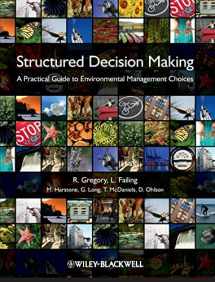
Structured Decision Making: A Practical Guide to Environmental Management Choices
Book details
Summary
Description
This book outlines the creative process of making environmental management decisions using the approach called Structured Decision Making. It is a short introductory guide to this popular form of decision making and is aimed at environmental managers and scientists. This is a distinctly pragmatic label given to ways for helping individuals and groups think through tough multidimensional choices characterized by uncertain science, diverse stakeholders, and difficult tradeoffs. This is the everyday reality of environmental management, yet many important decisions currently are made on an ad hoc basis that lacks a solid value-based foundation, ignores key information, and results in selection of an inferior alternative. Making progress – in a way that is rigorous, inclusive, defensible and transparent – requires combining analytical methods drawn from the decision sciences and applied ecology with deliberative insights from cognitive psychology, facilitation and negotiation.
The authors review key methods and discuss case-study examples based in their experiences in communities, boardrooms, and stakeholder meetings. The goal of this book is to lay out a compelling guide that will change how you think about making environmental decisions.
Visit www.wiley.com/go/gregory/sdm to access the figures and tables from the book.


We would LOVE it if you could help us and other readers by reviewing the book
Book review



